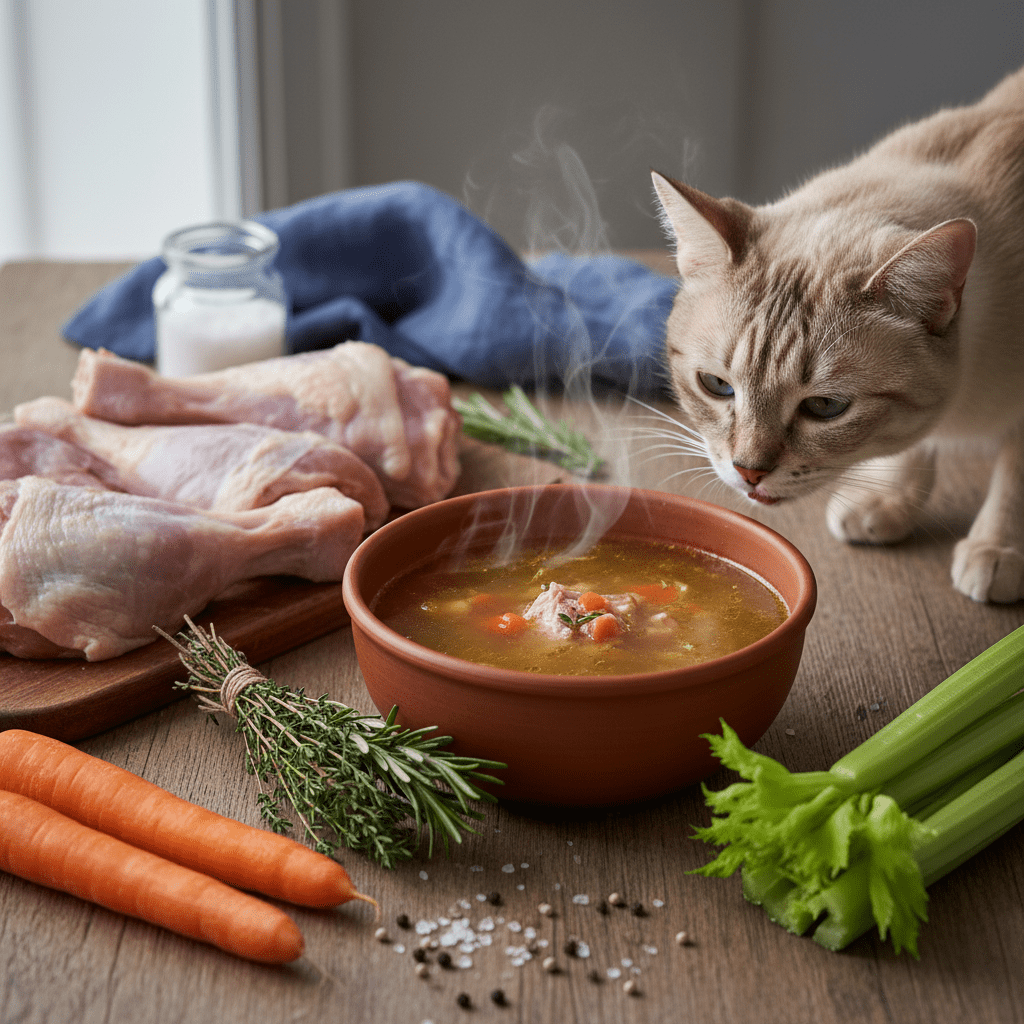Key Takeaways
- Gentle, natural remedies can have significant positive effects on pets' health.
- Turkey broth is beneficial for cats, especially in supporting hydration and appetite.
- Using turkey broth is a natural approach to enhance a cat's overall wellness.
- Pet parents are increasingly turning to turkey broth as a supportive care option.
Table of Contents
- Turkey Broth for Cats: Your Natural Path to Better Feline Health
- Why Turkey Broth? Understanding Its Role in Feline Wellness
- Nutritional Breakdown: What's in Turkey Broth for Cats?
- Is Turkey Broth Safe for All Cats? Risks, Precautions & Allergies
- Turkey Broth Comparisons – Chicken Broth, Bone Broth & More
- Best Life 4 Pets' Holistic Approach: Broth as Part of Natural Health
- Storing, Serving, and Sourcing – The Logistics of Cat Broth
- The Best Ways to Incorporate Turkey Broth Into Your Cat's Routine
- Turkey Broth for Special Situations: Hydration, Illness & Recovery
- What to Watch For – Side Effects & Troubleshooting
Turkey Broth for Cats: Your Natural Path to Better Feline Health
When my Border Collie mix Tango was struggling with medication side effects, I discovered that sometimes the gentlest solutions create the biggest changes. That same principle applies to our feline family members. Turkey broth for cats has become a game-changer for pet parents seeking natural ways to support their cat's hydration, appetite, and overall wellness.
This isn't just another trendy pet supplement, it's a time-tested approach that aligns perfectly with our "Nurture with Nature" philosophy. Whether you're dealing with a finicky eater, supporting an aging cat, or simply want to boost your kitty's daily nutrition, turkey broth offers a gentle yet effective solution that cats actually enjoy. Cat Laxative & Constipation Relief can be a helpful addition for cats with digestive issues, complementing the benefits of turkey broth.
For pet parents looking to address joint discomfort or mobility issues alongside improved nutrition, consider pairing turkey broth with a Cat Hip & Joint Pain Relief for comprehensive support.
Quick Answer: Turkey broth for cats is a nutrient-rich liquid made by simmering turkey meat (and sometimes bones) in water. It's safe for most cats when prepared without harmful additives like onions, garlic, or excessive salt. The broth supports hydration, provides essential amino acids, and can help encourage eating in reluctant cats.
Why Turkey Broth? Understanding Its Role in Feline Wellness

Cat parents are discovering what holistic veterinarians have known for years: turkey broth for cats addresses multiple wellness needs simultaneously. Unlike synthetic supplements that target single issues, this whole-food approach supports your cat's body naturally.
The magic lies in turkey broth's unique combination of easily digestible protein, amino acids, and natural electrolytes. These nutrients work together to support kidney function, joint comfort, and digestive health, three areas where many cats struggle as they age. Research shows that the amino acid profile in turkey closely matches what cats need for optimal muscle maintenance and immune function.
Take Bailey, a 12-year-old tabby whose appetite disappeared after dental surgery. Within three days of adding turkey broth to her routine, she was eagerly approaching her food bowl again. Her owner noticed improved energy levels and better hydration, exactly what we hope to see when supporting our cats naturally.
Nutritional Breakdown: What's in Turkey Broth for Cats?
Understanding what makes turkey broth beneficial helps you make informed decisions about your cat's nutrition. Turkey bone broth differs from simple turkey broth in its collagen content and mineral profile, though both offer valuable support for feline health.
Pure turkey broth provides high-quality protein in an easily digestible form, along with essential amino acids like taurine (when bones are included), glycine, and proline. These compounds support everything from heart health to coat shine. The gentle cooking process breaks down proteins into smaller, more bioavailable forms that stressed or elderly cats can process more easily.
| Nutrient Component | Benefit for Cats | Why It Matters |
|---|---|---|
| Protein (3-5g per cup) | Muscle maintenance | Easily absorbed during illness or stress |
| Natural electrolytes | Hydration support | Critical for kidney and heart function |
| Amino acids | Immune system support | Building blocks for cellular repair |
| Minimal fat content | Gentle on digestion | Suitable for sensitive stomachs |
What's equally important is what quality turkey broth doesn't contain: artificial preservatives, excessive sodium, or inflammatory ingredients. This purity makes it suitable for cats with sensitive systems who can't tolerate heavily processed foods. For more information on what foods are safe or unsafe for your feline, check out best worst human foods for cats.
Scientific studies on bone broth consumption in animals show improved joint mobility and digestive function, though more feline-specific research is ongoing. The anecdotal evidence from our pet parent community consistently shows positive results for appetite stimulation and hydration support.
Is Turkey Broth Safe for All Cats? Risks, Precautions & Allergies
While turkey broth is generally safe for most cats, certain situations require extra caution. Cats with poultry allergies, chronic kidney disease, or those on restricted diets should be introduced to turkey broth gradually and under veterinary guidance.
The primary safety concerns revolve around preparation and ingredients rather than turkey itself. Commercial broths may contain onions, garlic, excessive salt, or artificial additives that can harm cats. Even small amounts of these ingredients can cause digestive upset or more serious health issues in sensitive felines.
Ingredients to Always Avoid:
- Onions and onion powder (can damage red blood cells)
- Garlic in any form (toxic to cats)
- Excessive sodium (strains kidneys)
- Artificial preservatives and flavor enhancers
Signs that your cat may not tolerate turkey broth include vomiting within 2-4 hours of consumption, diarrhea, excessive scratching, or lethargy. These reactions are rare with properly prepared broth but should prompt immediate discontinuation and veterinary consultation if severe.
Turkey Broth Comparisons – Chicken Broth, Bone Broth & More

Not all broths are created equal for our feline friends. While turkey broth for cats offers unique benefits, understanding how it stacks up against other popular options helps you make the best choice for your cat's specific needs.
| Attribute | Turkey Broth | Chicken Broth | Bone Broth | Beef Broth |
|---|---|---|---|---|
| Flavor Appeal | Mild, easily accepted | Familiar, strong appeal | Rich, deep flavor | Heavy, can overwhelm |
| Protein Content | Lean, digestible | Moderate protein | High collagen | Dense, fatty |
| Digestibility | Excellent for sensitive cats | Good for most cats | Variable, depends on fat | Can cause upset |
| Allergy Risk | Lower (novel protein) | Higher (common allergen) | Depends on source | Moderate to high |
| Shelf Life | 5-7 days refrigerated | 5-7 days refrigerated | 7+ days (gelatin helps) | 4-6 days refrigerated |
Turkey broth shines for cats with food sensitivities or those transitioning between diets. Its mild flavor makes it an excellent choice for picky eaters, while the lean protein profile supports cats managing weight or digestive issues. If your cat is experiencing kidney issues, you may also want to read foods for cats with kidney problems for additional dietary guidance.
Chicken broth remains popular due to familiarity, but many cats develop sensitivities to chicken over time. Bone broth provides additional joint-supporting compounds but can be too rich for cats with sensitive stomachs. The higher fat content in bone broth may also trigger digestive upset in some felines.
Best Life 4 Pets' Holistic Approach: Broth as Part of Natural Health
At Best Life 4 Pets, we view turkey broth for cats as one piece of a comprehensive wellness puzzle. While broth supports hydration and palatability, true healing happens when we address the root causes of our cats' health challenges through gentle, natural methods.
Our community sees the best results when combining nutrient-rich broths with targeted homeopathic support. Take Whiskers, a 12-year-old rescue who struggled with joint stiffness and poor appetite. His mom Rachel started with turkey broth to encourage eating, then added our natural joint support pellets. Within weeks, Whiskers was moving more freely and actually looking forward to mealtime. For cats with ongoing joint discomfort, Cat Hip & Joint Pain Relief can be a valuable addition to their wellness routine.
This approach reflects our "Nurture with Nature" philosophy – supporting the body's own healing mechanisms rather than masking symptoms. Turkey broth provides immediate comfort and nutrition, while our gentle remedies work deeper to restore balance and vitality.
The beauty lies in simplicity. A warm bowl of turkey broth becomes an act of love that opens the door to deeper healing. Whether you're supporting a senior cat's joints or helping a rescue build trust through food, these small daily rituals create lasting wellness.
Storing, Serving, and Sourcing – The Logistics of Cat Broth
Proper storage keeps your turkey broth safe and nutritious. Homemade broth stays fresh for 5-7 days in the refrigerator when stored in clean, airtight containers. For longer storage, freeze broth in ice cube trays – perfect single-serving portions that thaw quickly.
When sourcing commercial broth, scrutinize labels carefully. Safe options contain only turkey, water, and perhaps minimal vegetables like carrots. Avoid any broth containing onion, garlic, excessive sodium, or artificial preservatives. Look for "cat-safe" or "pet-safe" labeling when available. For more on reading pet food labels, see this FDA guide to pet food labels.
Spoiled broth develops a sour smell, cloudy appearance, or slimy texture. When in doubt, discard it. Your cat's sensitive digestive system can't handle what might seem like minor spoilage to us.
Safe Broth Handling Checklist:
- Cool completely before refrigerating
- Use clean containers and utensils
- Label with preparation date
- Serve at room temperature or slightly warm
- Discard after 7 days maximum
The Best Ways to Incorporate Turkey Broth Into Your Cat's Routine

Start small and build gradually. Introduce turkey broth by mixing one teaspoon with your cat's regular food, increasing to 1-2 tablespoons per meal as they adjust. This gentle approach prevents digestive upset while building positive associations. If your cat struggles with constipation, pairing broth with a Cat Laxative & Constipation Relief may help support regularity.
Morning routines work particularly well for broth serving. Many cats are naturally hungrier after sleeping, making them more receptive to new flavors. For senior cats or those with mobility issues, consider serving broth slightly warmed (never hot) to enhance aroma and encourage consumption.
The key is consistency without pressure. Some cats take weeks to fully embrace new additions to their diet, while others dive in immediately. Track your cat's response in a simple journal, noting appetite changes, energy levels, and overall enthusiasm around meal times. For more tips on keeping your cat healthy as they age, read 7 tips for preventing kidney disease in cats.
Turkey Broth for Special Situations: Hydration, Illness & Recovery
Dehydration sneaks up on cats more easily than most pet parents realize. Unlike dogs, cats have a naturally low thirst drive, making turkey broth for cats a gentle bridge to better hydration. During hot summer months or stressful periods like moving homes, many cats simply don't drink enough water.
Post-surgery recovery presents another opportunity where broth shines. When cats feel nauseous or reluctant to eat solid food, the mild flavor and liquid consistency of turkey broth can provide essential nutrients while encouraging fluid intake. Always check with your vet first, but many recommend broth as part of recovery protocols. If your cat is recovering from surgery or illness, you might also find these hip and joint surgery after care tips for dogs and cats helpful.
Senior cats particularly benefit from broth's dual hydration and nutrition support. As kidney function naturally declines with age, maintaining fluid balance becomes crucial. The gentle protein in turkey broth supports muscle maintenance without overwhelming aging digestive systems.
Luna, a 12-year-old Persian, struggled with summer dehydration until her owner started offering cool turkey broth twice daily. Within a week, Luna's energy returned and her water intake improved significantly. Her owner now keeps frozen broth cubes ready for particularly warm days.
Remember that broth supports wellness but never replaces proper veterinary care. If your cat shows signs of illness, dehydration, or unusual behavior, consult your vet immediately while using broth as a complementary comfort measure. For more on feline nutrition, see this overview of cat food.
What to Watch For – Side Effects & Troubleshooting
Most cats tolerate turkey broth beautifully, but monitoring during the first few days prevents minor issues from becoming concerns. Loose stools occasionally occur when introducing any new food, typically resolving within 24-48 hours as your cat's system adjusts.
Some cats initially refuse broth altogether, and that's completely normal. Cats are naturally cautious about new flavors and textures. Try mixing just a teaspoon with their regular food, or offer it at different temperatures to find their preference.
Red Flags for Immediate Discontinuation:
- Vomiting within hours of consumption
- Skin irritation or excessive scratching
- Lethargy or unusual behavior
- Diarrhea lasting more than 48 hours
- Loss of appetite for regular meals
Fat separation in homemade broth can cause digestive upset in sensitive cats. Always skim excess fat from the surface before serving, and ensure proper storage temperatures to prevent spoilage. If your broth develops an off smell or slimy texture, discard it immediately.
For cats who consistently reject turkey broth, consider chicken broth as an alternative, or try serving broth frozen in lick mats for a different sensory experience. Some cats prefer the interactive element of "hunting" their nutrition rather than passive bowl drinking. If your cat needs additional immune support, Cat Allergy Relief & Immune Support may help boost their overall wellness.
Frequently Asked Questions
What are the main health benefits of giving turkey broth to cats?
Turkey broth supports your cat’s hydration and can help encourage appetite, especially in picky or recovering cats. It provides easily digestible nutrients that gently support overall wellness and may ease discomfort associated with digestive or mobility issues when paired with natural remedies.
Is turkey broth safe for all cats, and are there any risks or allergies to be aware of?
Turkey broth is generally safe for most cats when prepared without harmful ingredients like onions, garlic, or added salt. However, some cats may have allergies or sensitivities to turkey, so it’s best to introduce it gradually and watch for any adverse reactions. Always consult your vet if you’re unsure.
How does turkey broth compare to other broths like chicken broth or bone broth for feline wellness?
Turkey broth offers similar hydration and nutrient benefits as chicken broth but with a different flavor that some cats prefer. Unlike richer bone broths, turkey broth is typically lighter and easier to digest, making it a gentle option for cats needing natural support without overwhelming their system.
What are the best ways to incorporate turkey broth into my cat's daily routine, especially for hydration and recovery?
Serve turkey broth warmed (not hot) over your cat’s regular food or offer it as a tasty hydration treat between meals. It’s especially helpful during illness or recovery to encourage fluid intake and appetite. Keep broth fresh and free from additives, and use it alongside holistic remedies for comprehensive care.



